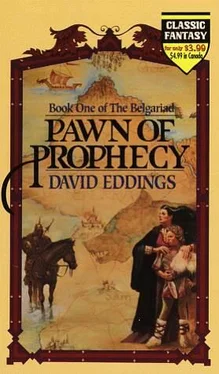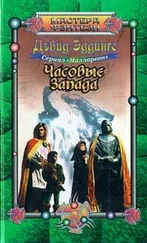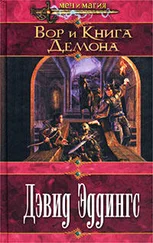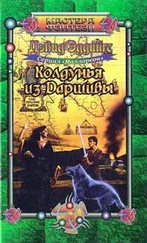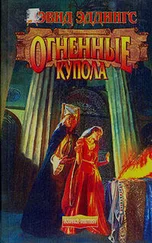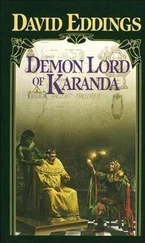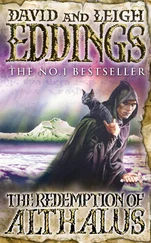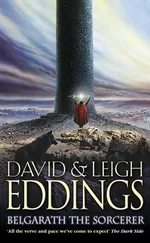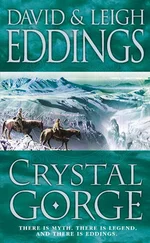David Eddings - Pawn of Prophecy
Здесь есть возможность читать онлайн «David Eddings - Pawn of Prophecy» весь текст электронной книги совершенно бесплатно (целиком полную версию без сокращений). В некоторых случаях можно слушать аудио, скачать через торрент в формате fb2 и присутствует краткое содержание. Жанр: Фэнтези, на английском языке. Описание произведения, (предисловие) а так же отзывы посетителей доступны на портале библиотеки ЛибКат.
- Название:Pawn of Prophecy
- Автор:
- Жанр:
- Год:неизвестен
- ISBN:нет данных
- Рейтинг книги:3 / 5. Голосов: 1
-
Избранное:Добавить в избранное
- Отзывы:
-
Ваша оценка:
- 60
- 1
- 2
- 3
- 4
- 5
Pawn of Prophecy: краткое содержание, описание и аннотация
Предлагаем к чтению аннотацию, описание, краткое содержание или предисловие (зависит от того, что написал сам автор книги «Pawn of Prophecy»). Если вы не нашли необходимую информацию о книге — напишите в комментариях, мы постараемся отыскать её.
Pawn of Prophecy — читать онлайн бесплатно полную книгу (весь текст) целиком
Ниже представлен текст книги, разбитый по страницам. Система сохранения места последней прочитанной страницы, позволяет с удобством читать онлайн бесплатно книгу «Pawn of Prophecy», без необходимости каждый раз заново искать на чём Вы остановились. Поставьте закладку, и сможете в любой момент перейти на страницу, на которой закончили чтение.
Интервал:
Закладка:
"At least I beat Kal Torak," he told Aunt Pol somewhat drowsily.
She looked at him sharply.
"Where did you hear about Torak?" she demanded.
"It’s Kal Torak, Aunt Pol," Garion explained patiently.
"Answer me."
"The farmers were telling stories—old Cralto and the others—about Brand and Vo Mimbre and Kal Torak and all the rest. That’s what Rundorig and I were playing. I was Brand and he was Kal Torak. I didn’t get to uncover my shield, though. Rundorig hit me on the head before we got that far."
"I want you to listen to me, Garion," Aunt Pol said, "and I want you to listen carefully. You are never to speak the name of Torak again."
"It’s Kal Torak, Aunt Pol," Garion explained again, "not just Torak."
Then she hit him—which she had never done before. The slap across his mouth surprised him more than it hurt, for she did not hit very hard.
"You will never speak the name of Torak again. Never!" she said. "This is important, Garion. Your safety depends on it. I want your promise."
"You don’t have to get so angry about it," he said in an injured tone.
"Promise."
"All right, I promise. It was only a game."
"A very foolish one," Aunt Pol said. "You might have killed Rundorig."
"What about me?" Garion protested.
"You were never in any danger," she told him. "Now go to sleep."
And as he dozed fitfully, his head light from his injury and the strange, bitter drink his aunt had given him, he seemed to hear her deep, rich voice saying, "Garion, my Garion, you’re too young yet." And later, rising from deep sleep as a fish rises toward the silvery surface of the water, he seemed to hear her call, "Father, I need you." Then he plunged again into a troubled sleep, haunted by a dark figure of a man on a black horse who watched his every movement with a cold animosity and something that hovered very near the edge of fear; and behind that dark figure he had always known to be there but had never overtly acknowledged, even to Aunt Pol, the maimed and ugly face he had briefly seen or imagined in the fight with Rundorig loomed darkly, like the hideous fruit of an unspeakable evil tree.
2
Not long after in the endless noon of Garion’s boyhood, the storyteller appeared once again at the gate of Faldor’s farm. The storyteller, who seemed not to have a proper name as other men do, was a thoroughly disreputable old man. The knees of his hose were patched and his mismatched shoes were out at the toes. His long-sleeved woolen tunic was belted about the waist with a piece of rope, and his hood, a curious garment not normally worn in that part of Sendaria and one which Garion thought quite fine with its loosely fitting yoke covering shoulders, back and chest, was spotted and soiled with spilled food and drink. Only his full cloak seemed relatively new. The old storyteller’s white hair was cropped quite close, as was his beard. His face was strong, with a kind of angularity to it, and his features provided no clue to his background. He did not resemble Arend nor Cherek, Algar nor Drasnian, Rivan nor Tolnedran, but seemed rather to derive from some racial stock long since forgotten. His eyes were a deep and merry blue, forever young and forever full of mischief
The storyteller appeared from time to time at Faldor’s farm and was always welcome. He was in truth a rootless vagabond who made his way in the world by telling stories. His stories were not always new, but there was in his telling of them a special kind of magic. His voice could roll like thunder or hush down into a zephyr-like whisper. He could imitate the voices of a dozen men at once; whistle so like a bird that the birds themselves would come to him to hear what he had to say; and when he imitated the howl of a wolf, the sound could raise the hair on the backs of his listeners’ necks and strike a chill into their hearts like the depths of a Drasnian winter. He could make the sound of rain and of wind and even, most miraculously, the sound of snow falling. His stories were filled with sounds that made them come alive, and through the sounds and the words with which he wove the tales, sight and smell and the very feel of strange times and places seemed also to come to life for his spellbound listeners.
All of this wonder he gave freely in exchange for a few meals, a few tankards of ale, and a warm spot in the hay barn in which to sleep. He roamed about the world seemingly as free of possessions as the birds.
Between the storyteller and Aunt Pol there seemed to be a sort of hidden recognition. She had always viewed his coming with a kind of wry acceptance, knowing, it seemed, that the ultimate treasures of her kitchen were not safe so long as he lurked in the vicinity. Loaves and cakes had a way of disappearing when he was around, and his quick knife, always ready, could neatly divest the most carefully prepared goose of a pair of drumsticks and a generous slab of breast meat with three swift slices when her back was turned. She called him "Old Wolf," and his appearance at the gate of Faldor’s farm marked the resumption of a contest which had obviously been going on for years. He flattered her outrageously even as he stole from her. Offered cookies or dark brown bread, he would politely refuse and then steal half a plateful before the platter had moved out of his reach. Her beer pantry and wine cellar might as well have been delivered into his hands immediately upon his appearance at the gate. He seemed to delight in pilferage, and if she watched him with steely eye, he found quite easily a dozen confederates willing to sack her kitchen in exchange for a single story.
Lamentably, among his most able pupils was the boy Garion. Often, driven to distraction by the necessity of watching at once an old thief and a fledgling one, Aunt Pol would arm herself with a broom and drive them both from her kitchen with hard words and resounding blows. And the old storyteller, laughing, would flee with the boy to some secluded place where they would feast on the fruits of their pilferage and the old man, tasting frequently from a flagon of stolen wine or beer, would regale his student with stories out of the dim past.
The best stories, of course, were saved for the dining hall when, after the evening meal was over and the plates had been pushed back, the old man would rise from his place and carry his listeners off into a world of magical enchantment.
"Tell us of the beginnings, my old friend," Faldor, always pious, said one evening, "and of the Gods."
"Of the beginnings and the Gods," the old man mused. "A worthy subject, Faldor, but a dry and dusty one."
"I’ve noticed that you find all subjects dry and dusty, Old Wolf," Aunt Pol said, going to the barrel and drawing off a tankard of foamy beer for him.
He accepted the tankard with a stately bow. "It’s one of the hazards of my profession, Mistress Pol," he explained. He drank deeply, then set the tankard aside. He lowered his head in thought for a moment, then looked directly, or so it seemed, at Garion. And then he did a strange thing which he had never before done when telling stories in Faldor’s dining hall. He drew his cloak about him and rose to his full height.
"Behold," he said, his voice rich and sonorous, "at the beginning of days made the Gods the world and the seas and the dry land also. And cast they the stars across the night sky and did set the sun and his wife, the moon, in the heavens to give light unto the world.
"And the Gods caused the earth to bring forth the beasts, and the waters to bud with 6sh, and the skies to flower with birds.
"And they made men also, and divided men into Peoples.
"Now the Gods were seven in number and were all equal, and their names were Belar, and Chaldan, and Nedra, and Issa, and Mara, and Aldur, and Torak."
Читать дальшеИнтервал:
Закладка:
Похожие книги на «Pawn of Prophecy»
Представляем Вашему вниманию похожие книги на «Pawn of Prophecy» списком для выбора. Мы отобрали схожую по названию и смыслу литературу в надежде предоставить читателям больше вариантов отыскать новые, интересные, ещё непрочитанные произведения.
Обсуждение, отзывы о книге «Pawn of Prophecy» и просто собственные мнения читателей. Оставьте ваши комментарии, напишите, что Вы думаете о произведении, его смысле или главных героях. Укажите что конкретно понравилось, а что нет, и почему Вы так считаете.
